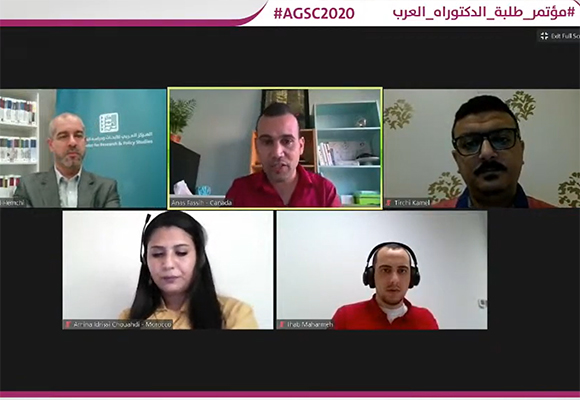 Arab Doctoral Students in Western Universities continued distance online sessions in the Arab Graduate Student Conference for a Second Day on Monday 10 August 2020, via zoom video links and live streaming on the social media platforms of the Arab Center for Research and Policy Studies, proceeding along the two tracks of “Conflict and Post-Conflict Studies” and “Economics and Finance.” Nanar Hawach reviewed his paper entitled “Reexamining Strategies of Resilience: A Study of Regime Resilience and Non-State Militias in the Syrian Civil War”. With the help of a theoretical framework drawing upon the contributions of Schleicht, Foucault, Weber, and Eisenstadt, Hawash examined the state’s function and monopoly on violence as seen in the case of the civil war in Syria, highlighting the sensitivity of handing over the force of violence, traditionally inherent in the function and sovereignty of the state, to dependent supporting militias.
Arab Doctoral Students in Western Universities continued distance online sessions in the Arab Graduate Student Conference for a Second Day on Monday 10 August 2020, via zoom video links and live streaming on the social media platforms of the Arab Center for Research and Policy Studies, proceeding along the two tracks of “Conflict and Post-Conflict Studies” and “Economics and Finance.” Nanar Hawach reviewed his paper entitled “Reexamining Strategies of Resilience: A Study of Regime Resilience and Non-State Militias in the Syrian Civil War”. With the help of a theoretical framework drawing upon the contributions of Schleicht, Foucault, Weber, and Eisenstadt, Hawash examined the state’s function and monopoly on violence as seen in the case of the civil war in Syria, highlighting the sensitivity of handing over the force of violence, traditionally inherent in the function and sovereignty of the state, to dependent supporting militias.
Within the same track, Salah Sharief presented his paper entitled “The Dehumanization of Drone Warfare,” in which he addressed the contribution of the technology of drone warfare to transforming the war from conflict limited to specific times and geographical locations to one extended over vast areas and open-ended time frames through use of aircraft possessing combat characteristics capable of simultaneously identifying and dehumanizing the enemy, stripping humanity from the combatant – engendering reduced resistance to killing and a greater readiness to engage in military operations. In the Economy and Finance track, Mustafa Nourallah presented his paper entitled “Understanding Young Individuals’ Initial Trust in Non-Sovereign Digital Currency,” in which he demonstrated the possibility of applying “unified theory” and “behavioral financial theory” in factor analysis and modeling of structural equations to test hypotheses, highlighting the relationship between studied factors and effects.
The Economics and Finance track continued on the Third Day of the conference (Tuesday 11 August) with researcher Mohammad Al-Asadi presenting his paper entitled “Financing Reconstruction in Conflict-Affected Countries,” in which he reviewed the importance of institution- and peace building in conflict-afflicted countries to achieve a sustainable economy that leads to financial stability. Amina Idrissi Chouahdi presented her paper entitled “Conditions for Applying International Accounting Standards in the Public Sector: a Comparative Study of Morocco and Belgium,” discussing the concept of financial accounting and the role of organizations in applying rules of transparency, efficiency and quality, noting the importance of taking into account the geographical and political context. Researcher Anas Fassih concluded work on the track with his paper “Transboundary Influences on Framing Renewable Energy Policies in the Middle East and North Africa: A Comparison between Morocco and the United Arab Emirates,” comparatively assessing the orientations of Chinese and German policies towards sustainable energy and formulation of energy transition policies in both countries, based on the comparative approach in economic analysis.
In the Political Theory track, researcher Nada Berrada tackled “Young People Getting By: Contextualizing Everyday Practices of Agency among Moroccan Youth," in which she showed the influence of Western media and political discourse on the youth of the Middle East and North Africa after 2011.
The Fourth Day of the conference (Wednesday 12 August 2020) contained two tracks, on Palestine Studies and Historical Studies. In Palestine Studies, Khaled Anabtawi presented his paper “Sectarian Space and the Controversy of Settler Colonialism in 1948 Occupied Palestine”. He focused on understanding the sociological structure of the sectarian space inside the Palestinian towns and villages in the Palestinian territories in 1948 in the context of researching the representations and manifestations of sectarianism within the towns at the local political organizational level and the local political space.
In the History track, Said El-Ghazi El-Imlahi discussed his paper entitled “Religious Policy of the Spanish Protectorate System in Northern Morocco,” focused on the structure of the Spanish Catholic state and how it was able, in certain historical circumstances, to govern the territory of the majority of its Muslim population, with a method of government that does not contradict their spiritual beliefs and their religious institutions. This study in historical anthropology attempts to define the nature of the colonial protection system and the religious centers of influence in Moroccan society, showing how an ideological discourse was able to dominate religious institutions politically and socially in those regions, for a short period of time.
The Arab Center will continue to present this online conference’s work In an interactive framework through social media and digital access platforms over the coming days, completing presentations of the participating students’ papers and including discussions of these presentations by an elite academic group of professors from the Doha Institute for Graduate Studies and Arab Center researchers.